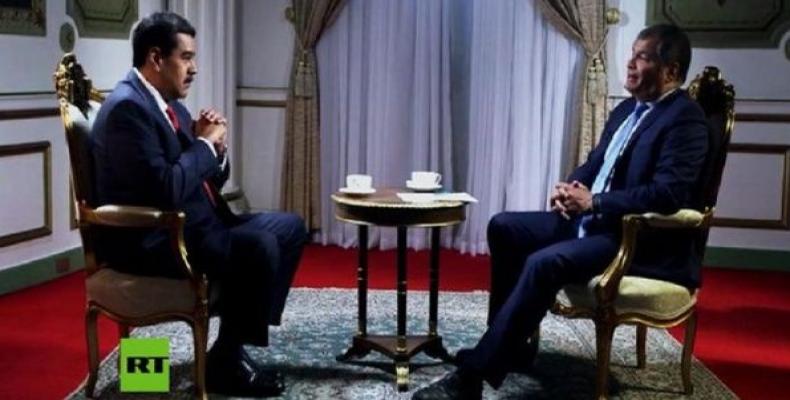Caracas, September 20 (RHC)-- In the new season of his RT TV show, Ecuador’s former President Rafael Correa on Thursday interviewed Venezuela’s President Nicolas Maduro at the Miraflores Palace in Caracas, where both critically addressed the complex realities the Bolivarian Revolution is currently facing.
During their one-hour conversation, the two leaders of contemporary Latin American politics talked about the economic and social situation of Venezuela, which, as Correa said, is "victim of a disinformation campaign" whereby the political opposition tries to benefit from problems that have been "clearly caused by the so-called 'sanctions' which are actually illegal aggressions against sovereign countries."
In order to highlight the effects of the U.S.-led economic aggression, President Maduro recalled that from the beginning of President Hugo Chavez's administration in 1999 up to 2015, “we had annual revenues of $50 billion from oil sales. Now we only receive $4 billion.”
Maduro also mentioned that the death of Commander Hugo Chavez in March 2013 meant a "very big blow" for his country because "internal enemies, but especially the U.S. imperial power, began to design tactics to replace Chavismo."
During the presidency of Donald Trump, over the last two years, "the war with Washington has had a devastating effect on our social stability and people's lives," the United Socialist Party of Venezuela (PSUV) leader said.
"Venezuela cannot either open or close international bank accounts. It cannot pay for any type of product. In addition, we are now being threatened with a complete naval blockade."
In his talk with Correa, the Bolivarian president once again denounced that the U.S. government actions imply many financial costs to the Venezuelans. "They have confiscated and robbed us of almost $30 billion," Maduro said and explained that Venezuela is carrying out "an economy of resistance."
In order to tackle this situation, his administration has established priority policies, one of which is food and medicine production. This goal is "at the center" of those priorities so as to be able to supply the population.
"Venezuela has no sanctions, it has aggressions," Maduro said and added: "Trump has an obsessive hatred against Latin American peoples, refugees, immigrants; he has a special hatred of the Venezuelan people and our history."
"I compare [what happens now] with the Hitler era, with that same vision that Hitler imposed against the Jews before the war," he stressed. Based on the challenges it faces at the current historical moment, the Venezuelan government is laying the long-term foundations to overcome the country's traditional dependence on oil revenues.
"I have defined 16 'development drivers' on the basis of our country's economic, industrial and technological realities," Maduro said and recalled that transforming a natural resources-based growth model, which has been in place for the last 100 years, is a difficult task.
Nevertheless, "despite all imperial aggressions, we are standing strong and ready to resume the path towards growth,", President Maduro affirmed.
For his part, in order to illustrate what is happening in Venezuelans' everyday live, Rafael Correa asked the audience to imagine what it means to live under siege. "Imagine a country which cannot sell oil, its main product; even if it could sell it and obtain some foreign currency, it cannot buy anything because it cannot use the international financial system," the Ecuadorean politician said.
“That is what they have done to Venezuela. And, in their eagerness to sanction a government without having the right to do so, they are sanctioning the whole population," Correa stressed.
Before finishing the interview, Correa invited President Maduro to describe in his own words the Venezuelan political system. "In Venezuela, they tell us, there is no democracy and you are a 'usurper'," Correa said provocatively.
"Over 20 years of revolution, we have had 25 elections for president, governors and mayors," Maduro replied and, with a hint of irony, he said that it would be "a strange dictatorship." The Venezuelan president recalled that the Chavista movement has beaten the opposition in 23 out of those 25 elections.
Rafael Correa concluded his program by reiterating his support for Nicolas Maduro and the Venezuelan people. "Intellectual honesty does not mean being neutral, which is impossible. Intellectual honesty means trying to maintain objectivity, despite the partiality we all have and our ideological inclinations."


